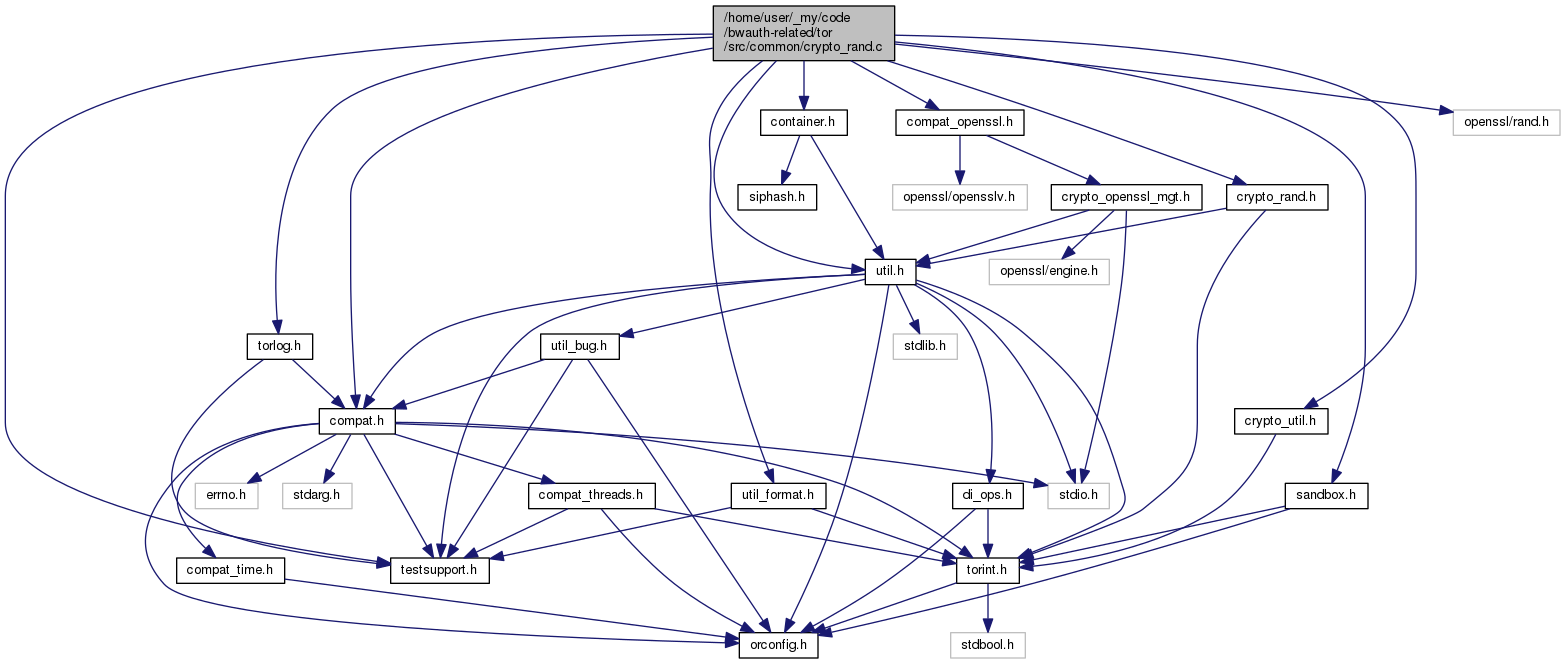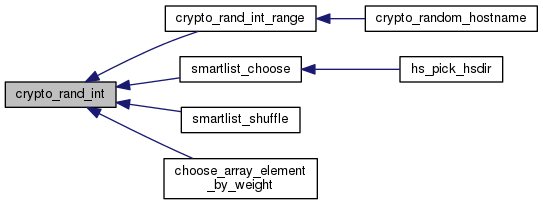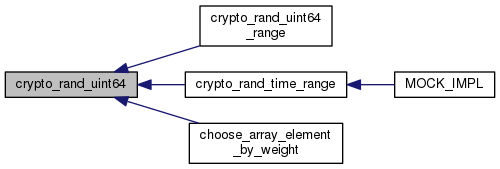Functions for initialising and seeding (pseudo-)random number generators, and working with randomness. More...
#include "crypto_rand.h"#include "container.h"#include "compat.h"#include "compat_openssl.h"#include "crypto_util.h"#include "sandbox.h"#include "testsupport.h"#include "torlog.h"#include "util.h"#include "util_format.h"#include <openssl/rand.h>
Macros | |
| #define | CRYPTO_RAND_PRIVATE |
| #define | ADD_ENTROPY 32 |
| #define | MAX_DNS_LABEL_SIZE 63 |
| #define | MAX_STRONGEST_RAND_SIZE 256 |
| #define | DLEN SHA512_DIGEST_LENGTH |
Functions | |
| void | crypto_seed_weak_rng (tor_weak_rng_t *rng) |
| STATIC int | crypto_strongest_rand_raw (uint8_t *out, size_t out_len) |
| void | crypto_strongest_rand (uint8_t *out, size_t out_len) |
| int | crypto_seed_rng (void) |
| MOCK_IMPL (void, crypto_rand,(char *to, size_t n)) | |
| void | crypto_rand_unmocked (char *to, size_t n) |
| int | crypto_rand_int (unsigned int max) |
| int | crypto_rand_int_range (unsigned int min, unsigned int max) |
| uint64_t | crypto_rand_uint64_range (uint64_t min, uint64_t max) |
| time_t | crypto_rand_time_range (time_t min, time_t max) |
| uint64_t | crypto_rand_uint64 (uint64_t max) |
| double | crypto_rand_double (void) |
| char * | crypto_random_hostname (int min_rand_len, int max_rand_len, const char *prefix, const char *suffix) |
| void * | smartlist_choose (const smartlist_t *sl) |
| void | smartlist_shuffle (smartlist_t *sl) |
| int | crypto_force_rand_ssleay (void) |
Detailed Description
Functions for initialising and seeding (pseudo-)random number generators, and working with randomness.
Macro Definition Documentation
◆ ADD_ENTROPY
| #define ADD_ENTROPY 32 |
How many bytes of entropy we add at once.
This is how much entropy OpenSSL likes to add right now, so maybe it will work for us too.
◆ MAX_DNS_LABEL_SIZE
| #define MAX_DNS_LABEL_SIZE 63 |
Longest recognized DNS query.
◆ MAX_STRONGEST_RAND_SIZE
| #define MAX_STRONGEST_RAND_SIZE 256 |
Largest strong entropy request permitted.
Function Documentation
◆ crypto_force_rand_ssleay()
| int crypto_force_rand_ssleay | ( | void | ) |
Make sure that openssl is using its default PRNG. Return 1 if we had to adjust it; 0 otherwise.
◆ crypto_rand_double()
| double crypto_rand_double | ( | void | ) |
Return a pseudorandom double d, chosen uniformly from the range 0.0 <= d < 1.0.

◆ crypto_rand_int()
| int crypto_rand_int | ( | unsigned int | max | ) |
Return a pseudorandom integer, chosen uniformly from the values between 0 and max-1 inclusive. max must be between 1 and INT_MAX+1, inclusive.

◆ crypto_rand_int_range()
| int crypto_rand_int_range | ( | unsigned int | min, |
| unsigned int | max | ||
| ) |
Return a pseudorandom integer, chosen uniformly from the values i such that min <= i < max.
min MUST be in range [0, max). max MUST be in range (min, INT_MAX].


◆ crypto_rand_time_range()
| time_t crypto_rand_time_range | ( | time_t | min, |
| time_t | max | ||
| ) |
As crypto_rand_int_range, but supports time_t.


◆ crypto_rand_uint64()
| uint64_t crypto_rand_uint64 | ( | uint64_t | max | ) |
Return a pseudorandom 64-bit integer, chosen uniformly from the values between 0 and max-1 inclusive.

◆ crypto_rand_uint64_range()
| uint64_t crypto_rand_uint64_range | ( | uint64_t | min, |
| uint64_t | max | ||
| ) |
As crypto_rand_int_range, but supports uint64_t.

◆ crypto_rand_unmocked()
| void crypto_rand_unmocked | ( | char * | to, |
| size_t | n | ||
| ) |
Write n bytes of strong random data to to. Most callers will want crypto_rand instead.
This function is not allowed to fail; if it would fail to generate strong entropy, it must terminate the process instead.

◆ crypto_random_hostname()
| char* crypto_random_hostname | ( | int | min_rand_len, |
| int | max_rand_len, | ||
| const char * | prefix, | ||
| const char * | suffix | ||
| ) |
Generate and return a new random hostname starting with prefix, ending with suffix, and containing no fewer than min_rand_len and no more than max_rand_len random base32 characters. Does not check for failure.
Clip max_rand_len to MAX_DNS_LABEL_SIZE.

◆ crypto_seed_rng()
| int crypto_seed_rng | ( | void | ) |
Seed OpenSSL's random number generator with bytes from the operating system. Return 0 on success, -1 on failure.
◆ crypto_seed_weak_rng()
| void crypto_seed_weak_rng | ( | tor_weak_rng_t * | rng | ) |
Set the seed of the weak RNG to a random value.

◆ crypto_strongest_rand()
| void crypto_strongest_rand | ( | uint8_t * | out, |
| size_t | out_len | ||
| ) |
Try to get out_len bytes of the strongest entropy we can generate, storing it into out.

◆ crypto_strongest_rand_raw()
| STATIC int crypto_strongest_rand_raw | ( | uint8_t * | out, |
| size_t | out_len | ||
| ) |
Try to get out_len bytes of the strongest entropy we can generate, storing it into out. Return 0 on success, -1 on failure. A maximum request size of 256 bytes is imposed.

◆ MOCK_IMPL()
| MOCK_IMPL | ( | void | , |
| crypto_rand | , | ||
| (char *to, size_t n) | |||
| ) |
Write n bytes of strong random data to to. Supports mocking for unit tests.
This function is not allowed to fail; if it would fail to generate strong entropy, it must terminate the process instead.

◆ smartlist_choose()
| void* smartlist_choose | ( | const smartlist_t * | sl | ) |
Return a randomly chosen element of sl; or NULL if sl is empty.


◆ smartlist_shuffle()
| void smartlist_shuffle | ( | smartlist_t * | sl | ) |
Scramble the elements of sl into a random order.

 1.8.13
1.8.13